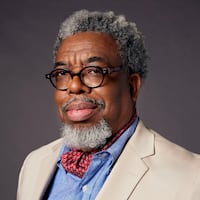At 9:30 a.m. Saturday, two buses from Cobb County, sponsored by the NAACP, rolled into Washington.
It was 14.5 hours after their scheduled — but not actual — departure time of 7 p.m. Friday. They were late for the start of the 50th anniversary of the March on Washington and anxious.
It had been a long ride. First, before the two chartered buses even rolled out of Marietta, the bus driver announced that the lead bus was acting up and had to be replaced. So they drove to East Point to get a new one.
Then there was a violent thunderstorm in North Georgia. Rush hour traffic in Virginia. There were two gas-and-bathroom breaks, one in North Carolina and another at 5:30 a.m. in Virginia, where chapter president Deane Bonner announced that there would not be a breakfast stop.
“We have to go straight to the rally,” she said. “I think we can all agree on that.”
No one objected.
Unlike most of the riders, 73-year-old Dorothy Matthews was already awake when the bus rolled into the Virginia gas station. While those around her slept, she quietly sang the spiritual “You Are my Fortress.”
“This is when I usually wake up,” she said. “I sing songs of thanks and being blessed. I am thankful and blessed today.”
More than 100 people had made the journey from Cobb on the two buses. Black people. White people. The elderly and kids.
“This is like being a part of history. It is amazing,” said 22-year-old LaToya Freeman, who was wearing a black Trayvon Martin T-shirt. “I never thought I would be part of something like this.”
When the weary travellers at last reached Washington, the buses swung into RFK Stadium, where they linked up with thousands of other marchers, converging on Washington in hundreds of buses.
If there were ever a symbol of the civil rights movement, it would be the bus.
It was a bus, albeit a municipal one, that launched the movement, when black seamstress Rosa Parks defied the driver’s command to move to the back.
Atlanta congressman John Lewis was one of hundreds of Freedom Riders, black and white, who were beaten and whose buses were firebombed when they tried to challenge interstate travel restrictions.
And it was on buses that many of the 250,000 people who attended the 1963 March for Jobs and Freedom got to Washington.
No one on either Cobb bus had attended the ‘63 march, where Martin Luther King Jr. set a tone for the nation with his “I Have a Dream” speech.
But for several, 2013 was a chance for redemption. Lorraine Mills took a day off from her job at a grocery store to do what she didn’t do 50 years ago when she was a student at Russell Sage College.
“One weekend in July (of 1963) some of us drove down to Washington and went to the Lincoln Memorial. It was dark, but they turned the lights on for us,” Mills said. “But I didn’t come to the March. I don’t remember if they had any buses going from my school.”
Mills, 70, said that when she heard that buses would be going to Washington this year, she jumped at the chance. The decision was solidified when she heard a radio story about Viola Liuzzo.
Liuzzo was a 39-year-old white woman killed in 1965 on the highway between Selma and Montgomery as she shuttled black marchers.
“She was (one of the) only white women killed during the movement,” Mills said. “So for me, I am kind of closing a chapter.”
Dianne Mathiowetz, a retired auto worker and veteran activist, was in high school in Minnesota when the original march happened. But in 1966, she was a college student at Rosary College in Chicago when civil rights marchers were met with violence in the Chicago suburb of Cicero.
“The civil rights movement has had a major impact on my life. I have been watching since (the 1957 integration of a high school in) Little Rock, and I was outraged that white adults were trying to prevent those students from going to school,” said Mathiowetz.
When she saw what was happening in Chicago, she said, she got mad and led a march of 24 students. “The movement altered my perception of justice and what was right and wrong with this country.”
Sam Manuel, 63, of Atlanta, said he was moved to travel to Washington “to celebrate 1963, but to also protest the Supreme Court’s effort to overturn those gains.” He said Saturday’s turnout will send a message to the court, “that it won’t happen without a fight.”
Football players Ryan and Brandon Ross missed their first high school football game Friday. Both are starters.
“I wanted to play, but this was important,” Brandon said.
Their mother, Mary Ross, is executive director of the NAACP’s Atlanta chapter. She said it was never an option for her sons to miss the march.
“They are in the 10th grade,” she said. “There will be more games.”
About the Author
Featured


